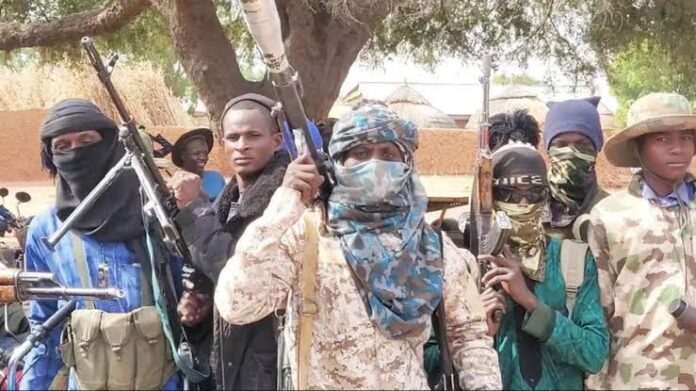Bello Turji, a notorious bandit leader, reportedly killed 12 people and injured one other after celebrating Eid in Sokoto State. The killings, which have shocked locals, took place in the Fadamar Lugu area of Isa Local Government Area (LGA) on Tuesday, shortly after Turji and his gang had hosted a large Eid feast in nearby Magira.
The disturbing events were revealed by a security analyst, Bakatsine, who shared the information in a post on the social media platform X on Wednesday. According to Bakatsine, Turji’s Eid celebration in Magira was attended by bandits from Zamfara State, some of whom had traveled across the border to join the feast.
However, the celebrations took a gruesome turn after the feast. Turji and his gang moved to Fadamar Lugu, where they engaged in what appears to have been a senseless act of violence. The attackers killed 12 innocent people and left one person injured, in what locals have described as an unnecessary display of terror. The killings have raised further concerns about the growing influence of bandit groups in the region.
Bello Turji is one of Nigeria’s most infamous bandit leaders, with a long history of attacks across the North-Western states of Sokoto and Zamfara. His gang is feared for their brutality and ruthlessness, regularly carrying out kidnappings for ransom, killings, and attacks on both civilians and security forces.
Turji’s name has become synonymous with banditry in the region. Over the years, he has been linked to numerous violent incidents, including attacks on villages, road ambushes, and clashes with security personnel. His operations are said to be well-coordinated, with some sources claiming that he operates from the forests between Sokoto and Zamfara, areas that are difficult for security forces to access.
The bandit leader’s group is also notorious for their demand for large ransoms, as well as their ability to carry out attacks with impunity. His gang’s frequent attacks have resulted in the deaths of many innocent Nigerians, with entire villages left in fear of further raids.
The killing spree in Fadamar Lugu on Tuesday is just the latest in a series of violent incidents attributed to Turji and his men. The fact that the attack followed an Eid celebration adds a chilling element to the story, with the violence happening just after a religious festival meant to bring peace and joy.
Sokoto State, like many parts of Nigeria’s northwest, has been a hotspot for banditry in recent years. The state’s vast, rugged terrain, coupled with the porous borders between Nigeria and neighboring countries like Niger, has made it a haven for bandits and criminals. This has led to growing concerns among residents and security officials about the inability to curb the spread of banditry.
For the residents of Isa LGA, the attack is a painful reminder of the danger they face on a daily basis. Local authorities have yet to respond publicly to the recent killings, but the incident has added to the growing pressure on the government to take stronger action against banditry in the northwest. While the Nigerian government has deployed military forces and police to tackle the menace, the sheer scale and frequency of attacks by bandits like Turji continue to overwhelm security efforts.
The situation has also drawn attention to the role of neighboring Zamfara State in the spread of banditry. It is widely believed that some of the bandits operating in Sokoto have connections to groups in Zamfara, which has long been regarded as a stronghold for criminal gangs. The fact that bandits from Zamfara were reportedly part of Turji’s Eid celebration in Sokoto highlights the cross-border nature of the problem.
The recent events in Sokoto underline the urgent need for a more coordinated and effective response to the growing threat of banditry in Nigeria’s northwest. The ongoing attacks have raised questions about the capacity of the Nigerian security forces to contain the spread of violence in the region.
Security experts argue that a combination of more robust military operations, better intelligence gathering, and community engagement is necessary to address the root causes of banditry. Some also call for the use of more advanced technology to track and neutralize bandits operating in the vast forests and remote areas of Sokoto, Zamfara, and surrounding states.
Locals have also emphasized the need for stronger collaboration between Nigeria’s federal government and state governments in the northwest. There are concerns that without a united front, the violence will continue to escalate, with more innocent lives lost.
While the killings in Fadamar Lugu are the latest tragedy in a region plagued by insecurity, they serve as a reminder of the dangers posed by groups like Turji’s. As banditry continues to spread, the need for a decisive response becomes ever more critical.

